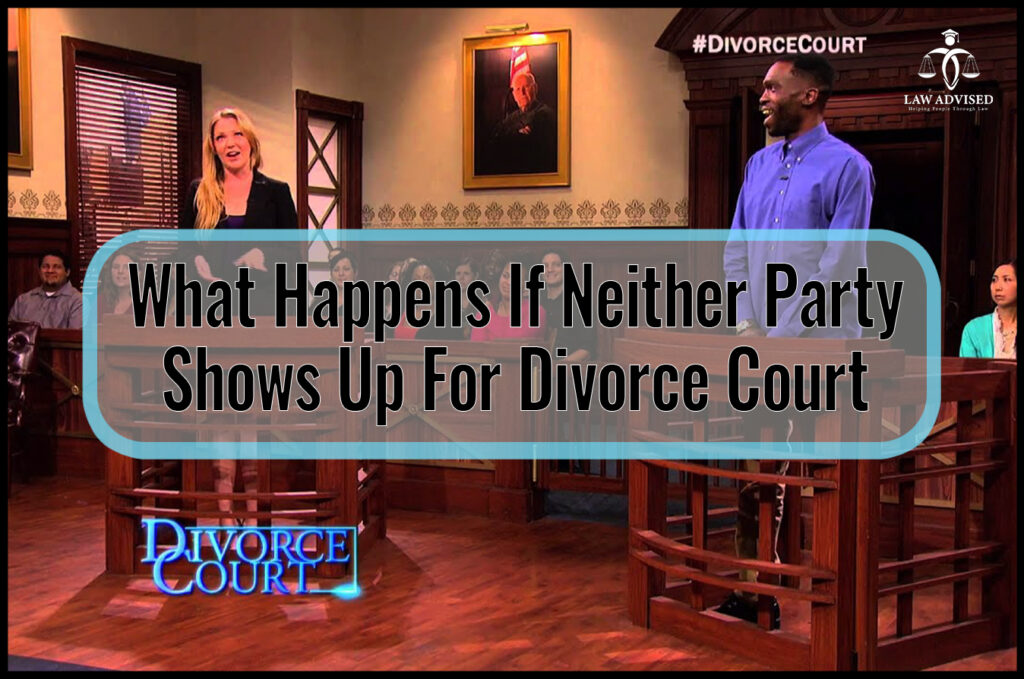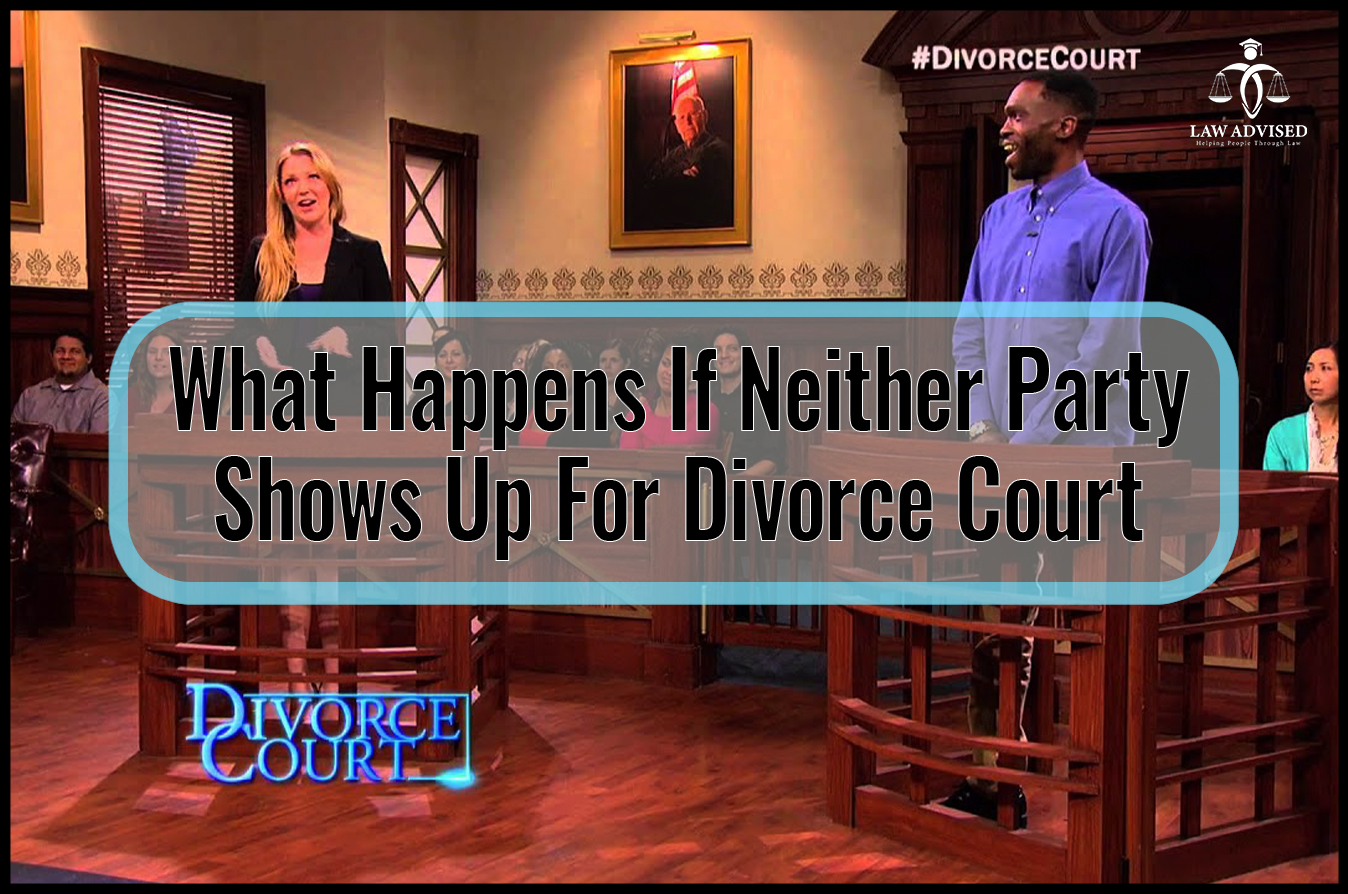If neither party shows up for divorce court, the case may be dismissed. This can lead to the divorce proceedings being delayed or starting all over again.
In some cases, the court may enter a default judgment in favor of the party who did appear. It is crucial for both parties to attend divorce court to ensure their interests are properly represented and to avoid potential consequences.
Legal Consequences Unveiled
When neither party shows up for divorce court, there can be serious legal consequences. In the case of the absence of both parties, the court may dismiss the case due to lack of participation. This can result in the divorce proceedings being halted, possibly causing delays and complications in the process.
If one spouse fails to show up, the court may proceed with the divorce hearing in their absence. The absent spouse may lose the opportunity to present their side of the case, and certain decisions may be made without their input.
Furthermore, the court may issue default judgments, which are decisions made in favor of the spouse who did appear in court. These judgments could impact matters such as division of assets, child custody, alimony, and child support.
It is important for both parties to attend divorce court to ensure their rights are protected and to avoid potential negative outcomes. Seeking legal counsel and understanding the legal consequences of absence is crucial in navigating the divorce process effectively.
Immediate Repercussions
When neither party shows up for divorce court, it can lead to automatic delays in proceedings. The court may postpone the decision until both parties are present or until new court dates can be scheduled. The absence of both parties can result in the extension of the divorce process, adding additional time and potentially increasing costs.
Impact On Divorce Settlement
| Impact on divorce settlement |
| Court intervention |
If neither party shows up for divorce court, it can have significant consequences on the divorce settlement. Without either party present, the court may have to intervene to make decisions on important matters such as alimony, child custody, and visitation rights, as well as the division of assets and debts.
Regarding alimony, the court may need to determine the appropriate amount based on the available evidence and information presented. Similarly, in terms of child custody, the court may have to establish a custody arrangement that is in the best interests of the child, considering various factors.
Furthermore, the court may need to address visitation rights, ensuring that the non-custodial parent still has the opportunity to maintain a meaningful relationship with their child. As for the division of assets and debts, the court may have to make decisions based on equitable distribution laws or other relevant factors.
Overall, when neither party shows up for divorce court, it can lead to court intervention, where the court makes decisions on crucial aspects of the divorce settlement to ensure a fair outcome for both parties involved.
Default Judgment
In the event that neither party shows up for divorce court, the court may issue a default judgment. A default judgment is a court’s decision issued in the absence of both parties. In a divorce case, this means that the court is likely to grant the divorce and make decisions regarding property division, child custody, and support based on the available information. It is important to note that a default judgment typically favors the party who did show up for court.
In an uncontested divorce, where both parties agree on all issues, it is not necessary for either party to attend the court hearing. Instead, the couple can submit a divorce agreement to the court for review and approval. Once the court is satisfied with the agreement, a divorce decree can be granted, finalizing the divorce.
Contempt Of Court
When neither party shows up for divorce court, it is considered contempt of court. Failure to appear can have serious consequences as the court has the authority to impose penalties. These penalties can include possible fines or imprisonment. It is important to take any court summons or notice seriously and make sure to attend scheduled court hearings. Failure to do so can result in legal consequences and may negatively impact the outcome of the divorce proceedings. If you are unable to attend a court hearing, it is crucial to notify the court in advance and provide a valid reason for your absence. This can help mitigate any potential penalties for contempt of court.
Rescheduling Court Date
In the event that neither party shows up for the scheduled divorce court hearing, it may be necessary to reschedule the court date. Procedures for rescheduling a new hearing can vary depending on the jurisdiction and the specific circumstances of the case. In most cases, a party or their attorney would need to file a motion with the court to request a new date. The court will then determine whether to grant the motion based on various factors, including the reason for the missed hearing and the availability of the court’s schedule. It’s important to note that rescheduling a court date may result in additional costs and time required for both parties involved in the divorce proceedings.
Court’s discretion
Ultimately, the decision to reschedule a court date is up to the discretion of the judge overseeing the case. The judge may consider various factors, such as the reasons for the missed hearing, the availability of the parties and their attorneys, and the overall impact on the progress of the divorce proceedings. It’s important for parties to communicate any conflicts or issues that may arise and to work with their attorneys to address any scheduling concerns. Failure to appear at a divorce court hearing without proper notification or a valid reason may have consequences, including potential sanctions or the dismissal of the case.
Consequences For The Initiating Spouse
When neither party shows up for divorce court, there are several consequences for the initiating spouse. The first consequence is the dismissal of the divorce case. If neither party is present, the court may choose to dismiss the case altogether. This means that all the progress made in the divorce process becomes null and void.
The initiating spouse will then have to reapply for divorce if they still wish to proceed. This involves filling out new paperwork, paying the necessary fees, and starting the process from scratch. It can be a time-consuming and frustrating experience for the spouse who initiated the divorce.
In addition, the restarting of the divorce process may also result in additional costs and delays. The court may require the initiating spouse to attend hearings and provide further documentation, further prolonging the divorce proceedings.
Impact On The Non-initiating Spouse
In the case of both parties failing to appear in divorce court, the non-initiating spouse may experience several negative consequences. Firstly, the lost opportunity to contest the divorce can significantly impact their ability to protect their interests and secure a fair settlement. Without appearing in court, the non-initiating spouse is unable to present evidence or arguments in their favor or challenge any claims made by the initiating spouse. This can limit their ability to influence the court’s decisions and can potentially result in an unfavorable outcome.
Moreover, the non-initiating spouse may face additional challenges in the post-divorce arrangements, such as child custody or spousal support. Without having their voice heard during the court proceedings, they may face difficulties in establishing their needs or advocating for their rights. It is crucial for both parties to be present in divorce court to ensure a fair and just outcome for all parties involved.
Steps To Mitigate The Consequences
When neither party shows up for divorce court, there can be serious consequences. However, there are steps you can take to mitigate these consequences.
The first step is to inform the court about your absence. This can be done by contacting the court clerk or your attorney and providing them with an explanation for your absence. It is important to be honest and provide any relevant documentation to support your claims.
If you are unable to attend the court hearing due to unavoidable circumstances, you may request a continuance. This can be done by filing a motion with the court requesting a new date for the hearing. It is advisable to consult with an attorney to ensure the proper legal procedures are followed.
Additionally, it is essential to seek legal representation if you haven’t already done so. An experienced attorney can guide and represent you in court, protecting your rights and ensuring that your interests are adequately represented.
Remember, it is important to take immediate action if you are unable to attend a divorce court hearing. By informing the court, requesting a continuance, and seeking legal representation, you can help mitigate the consequences of your absence.
Frequently Asked Questions For What Happens If Neither Party Shows Up For Divorce Court

What Happens If I Don’t Show Up For Divorce Court?
If you don’t show up for divorce court, the court may proceed with the case and make decisions without your input.
Can The Divorce Be Finalized If Neither Party Appears In Court?
Yes, the divorce can still be finalized if neither party appears in court, based on the evidence presented.
Is It Possible For The Court To Reschedule The Divorce Hearing?
In some cases, the court may reschedule the divorce hearing if a valid reason is provided for the absence.
What Are The Potential Consequences Of Not Attending Divorce Court?
The consequences of not attending divorce court could include unfavorable rulings on child custody, property division, and support.
Will I Be Notified If The Court Date Is Rescheduled?
Yes, you should be notified if the court decides to reschedule the divorce hearing.
Can I File A Motion To Postpone The Divorce Court Date?
You may be able to file a motion to postpone the divorce court date, but valid reasons must be provided.
Are There Any Penalties For Missing A Divorce Court Appearance?
Penalties for missing a divorce court appearance could include fines, warrants, and delays in the divorce process.
Can I Still Contest The Divorce Even If I Don’t Show Up In Court?
You may be able to contest the divorce even if you don’t show up in court, but it may be more challenging to do so.
Conclusion
If neither party shows up for divorce court, it can have serious consequences. The court may grant a default judgment, which means the non-appearing party may lose their chance to present their case. This highlights the importance of attending court hearings and being prepared.
Hiring an experienced attorney can be the key to navigating the divorce process and ensuring your rights are protected. Don’t underestimate the significance of showing up and actively participating in your divorce proceedings.
Ismail Hossain is the founder of Law Advised. He is an Divorce, Separation, marriage lawyer. Follow him.





Leave a Reply